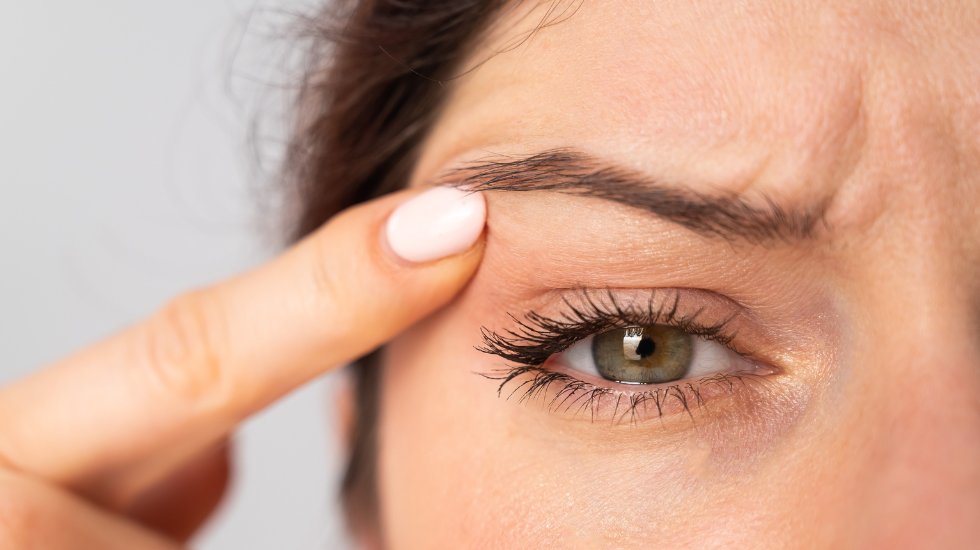When we talk about how to lower cortisol naturally, we’re really talking about how to live in a way that supports your entire being, from your energy and digestion to your mood, metabolism, and even your skin.
Cortisol is your body’s main stress hormone, and while it’s essential in small amounts, too much cortisol for too long can silently affect nearly every system in your body.
You might not even realize it’s happening at first. But over time, you may start to feel more tired, puffy, bloated, moody, or stuck in a pattern of cravings and tension you can’t quite shake.
In this article, we’ll explore what causes high cortisol, how it impacts all Four Cornerstones of wellness, and gentle, proven ways to bring your body back into balance naturally!
High Cortisol Can Affect Everything (Yes, Everything!)
We often think of stress as something we feel, like tension in the shoulders, a racing mind, trouble sleeping. But what many don’t realize is how deeply stress shows up physically in our bodies, especially through the hormone cortisol.
We actually want healthy levels in the morning to help us feel awake and ready to take on the day. The issue is when cortisol stays elevated far beyond what your body can handle.
That’s when things start to unravel, and you might not even realize it’s connected.
I see this in so many women I work with. They’re doing all the right things with food and movement, but still feel bloated, tired, and worn down. Their digestion feels off. Their skin looks dull.
They’re stuck in a cycle of sugar cravings or leaning too heavily on caffeine just to get through the day!
How High Cortisol Affects Skin, Collagen, and Aging
One of the most overlooked effects of cortisol is how it breaks down collagen, the very protein that gives our skin its firmness and youthful appearance. Chronic cortisol has also been linked with hair thinning, weakened nails, and even accelerated aging signs like wrinkles and dullness.
It also stores fat in the belly, which is not only frustrating when it comes to how we feel in our clothes, but is also associated with higher health risks over time.¹
If you’ve ever felt like you’re “doing everything right” and still can’t shift stubborn weight around your midsection, cortisol could be the missing link.
How Cortisol Impacts Digestion and Gut Health
Cortisol directly influences your digestion. When you’re under stress, your body prioritizes survival, meaning your digestive function slows way down. This can lead to bloating, constipation, gas, and food sitting heavy in your system.
And over time, it disrupts your microbiome, making it harder to absorb nutrients and easier for inflammation to take root.²
That’s one reason why supporting your gut health is so important during stressful seasons of life!
Cortisol, Anxiety, and Why Stress Feels So Overwhelming
From a mind-body perspective, cortisol is also linked to anxiety, emotional reactivity, and mood swings. It keeps the nervous system in a heightened state, which makes it harder to feel calm, joyful, or even present.
When cortisol is spiking, it can feel like you’re living in constant reaction, snapping at small things, struggling with decision fatigue, or just feeling stuck in a loop of worry and tension. This is what I sometimes call the “wild horse mind”, your thoughts racing, ungrounded, uncentered.
And that’s when everything begins to feel off balance.
How Cortisol Disrupts Your Inner Peace and Intuition
Cortisol doesn’t just live in the physical body. It impacts our energy, too.
When stress becomes chronic, it’s harder to connect with your intuition. It’s harder to sit in stillness or feel a sense of trust in the moment. Elevated cortisol pulls you into your head and away from your heart.
And if you’re living too much in that space of survival, it becomes almost impossible to feel aligned with your purpose, your joy, your creativity.
What Causes High Cortisol? (It’s Not Just Stress at Work)
Here’s something I want you to remember: high cortisol doesn’t just come from emotional stress.
There are a number of everyday habits that quietly push your cortisol levels higher than they should be!
1. Poor Sleep (Or the Wrong Sleep Schedule)
Your body’s natural rhythm, or circadian clock, is deeply tied to cortisol. Cortisol is meant to rise in the early morning to help you wake up, and slowly drop throughout the day so you can wind down and sleep.
But if you’re staying up late, exposed to too much blue light at night, or sleeping irregular hours, that rhythm becomes dysregulated. Your cortisol may be too low in the morning (leaving you groggy) and too high at night (making it hard to fall asleep).
This throws off your entire hormonal system, including your thyroid, digestion, and fat-burning ability.
Related Reading: Your Ultimate Wellness Guide to Gut and Sleep Health
2. Too Much Coffee (and Not Enough Food)
Caffeine naturally spikes cortisol, even more so if it’s consumed first thing on an empty stomach.
Add in skipping meals, intermittent fasting done improperly, or undereating throughout the day, and your blood sugar drops…which prompts your adrenals to release more cortisol to compensate.
I see this all the time in women who are trying to “be good” with food, but are unintentionally keeping their bodies in a constant stress response.
If you’re interested in cutting caffeine out of your life, I have a wonderful podcast that walks you through it!
3. Chronic Emotional Stress (Even the Quiet Kind)
We tend to associate stress with chaos, but chronic low-grade emotional stress (like self-doubt, comparison, resentment, or trying to “do it all”) can be just as damaging.
These emotional patterns constantly stimulate your nervous system and keep cortisol from settling back into a healthy rhythm.
This is why I always talk about the emotional and spiritual cornerstones because you can’t out-supplement or out-eat a racing mind or a heart that’s disconnected!
4. Over-Exercising (Especially High-Intensity Workouts Daily)
Exercise is so important for vitality, but too much intensity, too often, can actually backfire by pushing cortisol up over and over again.
This is especially true if you’re doing fasted cardio, multiple HIIT sessions a week, or skipping recovery days. If your body’s already under stress, hard workouts can add fuel to the fire, making it even harder to lose weight or feel calm and grounded.
5. Gut Imbalances and Toxin Overload
Your gut and liver play a huge role in helping your body regulate hormones, including cortisol. When you’re bloated, backed up, or inflamed from a sluggish gut, it adds to the stress load on your system.
If your body is too busy trying to process built-up waste, toxins, or inflammatory foods, it doesn’t have the space or resources to restore balance. This can lead to even more cortisol production and contribute to that bloated, sluggish feeling.
Related Reading: What Causes an Unhealthy Gut
How to Lower Cortisol Naturally With A Holistic Reset Plan
Cortisol was designed to rise and fall like a tide, not stay stuck in a flood!
So rather than trying to “fix” your stress overnight, I invite you to gently return to rhythm. With small, intentional shifts each day, you can support your body and lower cortisol naturally, feel calmer, and heal from the inside out.
Here’s how I reset my own cortisol, especially when I feel overwhelmed, tired, or like my digestion is off!
Sync with Your Natural Rhythm
One of the most powerful things you can do is simply honor your body’s timing.
That means going to bed earlier, before 10 p.m. if you can, and rising with the sun. Cortisol naturally peaks in the morning and declines in the evening, but screens, late dinners, and overstimulation can throw this off.
Eating your meals during daylight hours also helps regulate digestion and hormone production. Ayurveda has taught us for centuries that when we eat in alignment with nature, the body thrives.
Embrace Grounding, Joyful Practices
Stress doesn’t always come from “bad” things, it comes from too much input without enough exhale. That’s why grounding is so essential.
Make space each day for grounding practices that calm your nervous system. Even 5–10 minutes of journaling, breathwork, or sitting under a tree can shift you from reactive to receptive.
Move Your Body with Intention
You don’t have to push hard to feel good. In fact, if your cortisol is high, gentle movement like yoga, Pilates, or a brisk walk may be far more healing than intense workouts.
When your body feels safe, it lets go of inflammation, of tension, of bloating. And that’s when you begin to glow again.
Gut Support Is Essential for Lowering Cortisol
Your gut is one of cortisol’s biggest targets, and also one of your greatest tools for restoring balance.
When your gut flora is imbalanced, inflammation rises, your mood dips, and cortisol often stays elevated in response.
How SBO Probiotics Lower Cortisol Naturally
Research shows that a healthy, diverse gut microbiome helps regulate cortisol by:
- Improving resilience to stress
- Reducing inflammation
- Supporting the production of neurotransmitters like serotonin and GABA, which calm the nervous system
A 2017 randomized controlled trial published in Scientific Reports found that probiotic supplementation led to significantly reduced cortisol levels and improved mood in participants under chronic stress.³
Another review confirmed that certain strains of probiotics can reduce cortisol and anxiety levels in both animals and humans.⁴
While our Feel Good SBO Probiotics aren’t labeled as a pharmaceutical “stress relief” tool, they support a stronger, calmer gut-brain connection, which is key to helping your body regulate cortisol naturally.
Create Hormonal Balance from With Heart Coherence
One of the most powerful tools for lowering cortisol is right within your chest: your heart.
In my new book, The Hidden Power of Five Hearts, I share one of the most transformative practices I’ve ever developed, The HeartAlign Meditation™. It’s a simple but deeply powerful technique designed to help you feel more centered, more calm, and more in tune with the real you.
In a 4-week clinical study conducted in collaboration with the HeartMath Institute, participants who practiced heart coherence experienced:
A 23% average reduction in cortisol
A 100% increase in DHEA, a hormone linked to vitality, resilience, and well-being
This practice is about coming home to your heart. It gently guides you to connect inward, breathe with intention, and generate heart-centered emotions like gratitude and compassion. These may sound like soft practices, but they have profound, measurable effects on your body and hormones!
If you’ve ever felt stuck in stress mode, this practice can be a gentle, empowering way to return to peace! You can find the practice and more in The Hidden Power of Five Hearts!
Lower Cortisol Naturally Without the Overwhelm
You don’t have to push harder or live in constant overdrive to feel your best.
When you begin supporting your body with the right rhythm, through sleep, mindful nourishment, gentle movement, and gut support, you’ll notice your energy lift, your mood settle, and your body feel more like you again!
With love and steady calm,
Sources
- Foster, J. A., & McVey Neufeld, K.-A. (2013). “Gut–brain axis: how the microbiome influences anxiety and depression.” Trends in Neurosciences.
- Papalini S, Michels F, Kohn N, Wegman J, van Hemert S, Roelofs K, Arias-Vasquez A, Aarts E. Stress matters: Randomized controlled trial on the effect of probiotics on neurocognition. Neurobiol Stress.
- Wallace, C. J. K., & Milev, R. (2017). The effects of probiotics on depressive symptoms in humans: a systematic review. Frontiers in Psychiatry.
- Leigh, S.-J., Uhlig, F., Wilmes, L., Sanchez-Diaz, P., Gheorghe, C. E., Goodson, M. S., Kelley-Loughnane, N., Hyland, N. P., Cryan, J. F., & Clarke, G. (2023). The impact of acute and chronic stress on gastrointestinal physiology and function: a microbiota–gut–brain axis perspective. The Journal of Physiology.












0 Comments